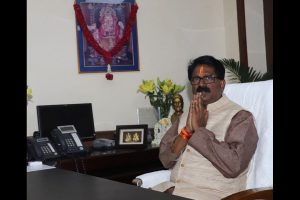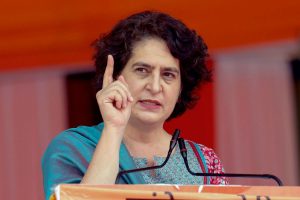On 29 July 1963, Vidyanagar College (Mahavidyalaya) was established in Vidyanagar, near Kolkata, in South 24 Parganas. This college is notable as the place where Pranab Mukherjee, the only Bengali President of India, began and ended his teaching career. He taught there for nearly five years, from 1964 to 1969. During 1966–67, Pranab Mukherjee served as the officiating principal of Vidyanagar College. In 1969, he left his teaching job to fully enter the political arena, gradually becoming a towering figure in Indian politics.
Now, about Vidyanagar. The name Vidyanagar, meaning ‘city of knowledge’, reflects the area’s rich tradition of education and scholarship. Although the local name of the place is Charashyam Das, this name has now fallen out of common use. It remains on paper. To the general public, it is now known as Vidyanagar. Today, we will take a tour of Vidyanagar College.
Upon entering the college, it felt like I had entered a large nursery. Everywhere, there were fruit and flower trees. The environment of the college is intoxicated by the fragrance of flowers. It would not be an exaggeration to say that Vidyanagar College is situated within a flower garden. The vast garden spans four to five bighas of land. It must be mentioned that the college management, especially the principal, Dr Surya Prakash Agarwala, played a significant role. Through his tireless efforts and endeavours, the college today possesses unparalleled beauty. I will write in detail about this later.
The college was founded by the eminent businessman Dhirendranath Bera. He is considered the architect of Vidyanagar. Not only Vidyanagar College but also two separate high schools for boys and girls, two primary schools, a district library, a post office, and all other necessary facilities for the development of society were established in the Vidyanagar area through his initiatives. All these together make up Vidyanagar. Dhirendranath Bera is not just a businessman; to the people here, he is truly a social reformer. The college founded by Dhirendranath Bera, Vidyanagar, is today truly the pride of the residents of Vidyanagar. I would not have understood that a government-aided college can be a symbol of the hopes and aspirations of the local populace had I not visited there.
When we arrived at the college to learn more about it, the principal, Surya Prakash Agarwala, and Bengali professor, Abashes Das, gave us a tour of the college campus and informed us about the current extensive activities of the college. It was truly astonishing. There seems to be nothing that the college is not involved in or any community welfare activity it isn’t connected with. Alongside academics, the college is active in physical exercise, sports, culture, environmental awareness, social service, and even keeping students and the local community constantly aware of agriculture, acknowledging that India is an agrarian country and agriculture is our foundation. In short, Vidyanagar College is a craftsman of ideal individuals.
The college currently has about 4,000 students. Like other colleges, the proportion of female students is higher here as well, with over sixty per cent being female. 62 teachers and 18 non-teaching staff continuously help the college maintain its prestige. At the undergraduate level, fourteen subjects are taught. Among them, nine subjects offer honours or major courses: Bengali, English, History, Political Science, Philosophy, Economics, B.Com., Mathematics and Zoology. Honours courses are offered in the Arts, Commerce, and Science departments. The college only has a daytime division. Academically, the college holds a high position at the University of Calcutta. Additionally, since 2006, postgraduate courses from Rabindra Bharati University have also been offered here as distance education in subjects like Bengali, English, philosophy, history, and a few others. It is known that the standard of education for distance education students is also very high. The Bengali Language and Literature Department of Vidyanagar College is extremely rich and enlightened. Two wall magazines, ‘Ankur’ and ‘Anwesha’, are regularly published by this department. It can be said that this department is intertwined with history and tradition. Renowned poet and editor of the timeless ‘Kavipattra’, Pabitra Mukhopadhyay, who won the Rabindra Puraskar, taught here. The department also had literary figures like Nimai Chandra Pal and the eminent essayist and social worker Shubhendu Barik as professors. Currently, the department is associated with two notable contemporary poets and essayists, Banani Chakraborty and Abashes Das. Therefore, it can be said that many famous and distinguished personalities, not just President Pranab Mukherjee, are connected with this college.
Not only the Bengali Department but also the history and philosophy departments publish two wall magazines through the efforts of the students. Another tradition of the college is ‘Uttaran’, a literary and cultural magazine that has been published for more than three decades, also covering scientific topics. Throughout the year, various cultural activities take place on the college campus, organised by different departments alongside academics. Let’s talk about the activities at the college beyond academics. First, let’s discuss health, which is essential after education. The college has two gyms: one for male students and another for female students. These were set up with assistance from the UGC. The gyms have trained trainers who guide students in their workouts. The principal mentioned that the college also has a high-quality yoga centre. He said that the yoga centre is renowned not just within the University of Calcutta but across the country. The college consistently performs well in yoga competitions organised by the University of Calcutta. Whenever the University of Calcutta sends a yoga team anywhere in India, a representative from this college is always included. Certified teachers, who are trained by SAI, provide yoga training. After completing the training, students receive certificates. Those trained here are connected to yoga centres across India. We are very proud that six of our yoga students are currently employed in various government hospitals in West Bengal.
The college is particularly famous for its Kho-Kho team. The college‘s Kho-Kho team is well-known within the University of Calcutta. Representatives from this college are always part of the University of Calcutta’s Kho-Kho team. This is also a matter of pride for the college. Besides this, the college always plays a significant role in other sports as well.
Among social projects, the most notable is the one managed by the NSS. Vidyanagar College has adopted four villages, where representatives from the college visit every month. The four villages, Moukali, Berapara, Sardarpara and Uttar Chandandaha, are located around the college. The college frequently organises medical camps in these villages, providing free eye exams, thalassemia tests, and polio vaccinations for children. The college plants trees around the campus and distributes the surplus trees to the residents of these villages for planting. Under the supervision of the NSS, there is an active team of two hundred students—one hundred from the first year and one hundred from the second year—who are involved in this program. The history department’s teacher, Alok Chakraborty, manages all NSS activities very efficiently. The University of Calcutta provides forty thousand rupees annually for this work, which is quite insufficient. Most of the expenses come from the college development fund. There are two gardeners paid from this fund to maintain the vast garden. The college has three ponds, which provide water for the garden and some fish. There are six beehive boxes. The college also has vermicomposting facilities, producing organic fertiliser used in the garden. producing a good amount of honey, some of which is sold. The college also has vermicomposting facilities, producing organic fertiliser used in the garden. Students learn this process hands-on, and any surplus worms are given to them so they can start vermicomposting at home. The college also cultivates mushrooms, which are sold as well.
Additionally, there is another feature: the ‘Herbal Garden.’ This was established so that the students could gain comprehensive knowledge about medicinal plants.
Thus, it can be said that Vidyanagar College is a blend of education, elegance, and tradition. The only Bengali President of India, Pranab Mukherjee, had a deep connection with Vidyanagar, and Vidyanagar College was not just his workplace but also held a special place in his heart. He maintained contact with this college until the last day of his life.












